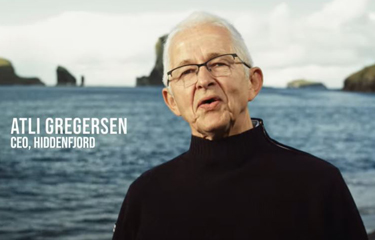Hiddenfjord has achieved a 94 percent reduction in its carbon emissions in one year following its decision to stop using airfreight to get its Atlantic salmon to North American and European markets.
Recognizing that airfreight is a major contributor to global CO2 emissions – producing around 50 times more CO2 than transoceanic sea freight, the family-run Faroese salmon farming company ceased its use of airfreight in favor of ocean-going ships in October 2020.
“We believe that salmon are meant to swim, not to fly,” Hiddenfjord CEO Atli Gregersen said. “More importantly, we believe we have a responsibility, not just to deliver the best possible salmon but to do so in the most sustainable way.”
To accomplish its switch to only ocean freight, the company devised a new processing and cooling system to keep its salmon fresh while also rethinking its entire global distribution chain.
“We have proven that our salmon is still just as good as salmon transported by air,” Gregersen said.
Announcing the results of a recent survey conducted by the Consumer Evaluation Center, Hiddenfjord found that in a blind taste-test of salmon shipped by air and sea, more than 100 consumers could not tell the difference, and rated both equally favorable in categories of taste, texture, and aroma.
“By creating a unique processing and cooling system and optimizing our sea transportation process, where we control the salmon’s temperature at all times, we have kept the quality of our sea-raised salmon high and even made it so that the salmon lasts longer,” Gregersen said.
Hiddenfjord’s salmon is packaged three hours after harvesting. It then remains in an unbroken, regulated cold chain until it reaches customers.
Meanwhile, an earlier study by Norwegian independent research organization SINTEF found that Hiddenfjord’s emissions from the production, slaughter, and packaging of its salmon in 2020 was 4.67 kilograms CO2 per kilo of edible meat, some 21 percent lower than the Norwegian industry average.
The main reason for the lower carbon footprint of Hiddenfjord salmon is that mortality is lower than the average for Norwegian salmon, SINTEF said.
Photo courtesy of Hiddenfjord







